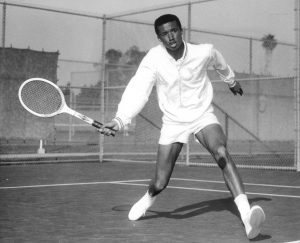The Arthur Ashe Legacy Project at UCLA has been awarded a $150,000 grant by the Andrew W. Mellon Foundation to support the continued development of the Arthur Ashe Oral History Project, the Arthur Ashe: An Inspiration Tour museum exhibition, and other projects.
The Arthur Ashe Legacy Project at UCLA is committed to preserving the legacy of Arthur Ashe ’66, tennis champion and socio-political activist, in perpetuity, by building and sustaining a state-of-the-art virtual and physical archive that captures materials relevant to the life of Arthur Ashe.
The grant will enable the Arthur Ashe Oral History Project to continue recording and archiving interviews with Ashe’s former teammates, friends and colleagues. Staff have already completed over 30 interviews but since many of Ashe’s contemporaries are already in their 80s, it is crucial to record additional interviews as soon as possible.
The Arthur Ashe: An Inspiration Tour museum exhibition originally opened at the U.S. Open in 2008 and was gifted to UCLA by the Arthur Ashe Learning Center in 2015 as part of the launch of the UCLA Arthur Ashe Legacy Project. While the exhibit was state-of-the-art for its time, it needs to be refreshed for modern in-person and virtual audiences. The Mellon grant will enable UCLA to work with a consultant to plan the next steps for the exhibition.
The grant will also support the creation of an Arthur Ashe Advisory Board to provide leadership on the activities of the Arthur Ashe Legacy Project.
Patricia A. Turner, professor in the departments of African American Studies and of World Arts & Cultures/Dance, is principal investigator of the Arthur Ashe Legacy Project. Turner noted that the grant will allow students and the public to continue to learn and draw inspiration from Ashe’s achievements both on and off the tennis court. In fact, the project has already had an impact, as students at UCLA and other universities have begun listening to and learning from the oral history interviews.
“Being able to use the interviews with current students emphasizes that this isn’t a project about the past, it’s a project about the present,” Turner said.



